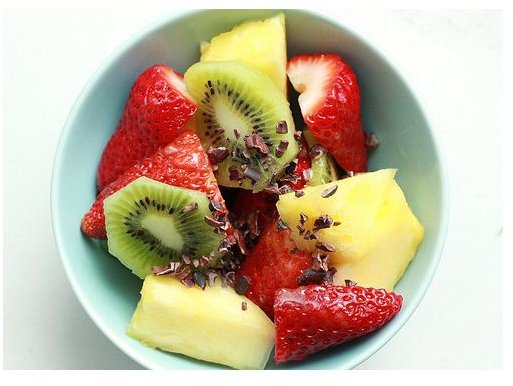Fruit VItamins and Minerals
Eating Fruit
The 2010 Dietary Guidelines for Americans recommends eating more fruits (and vegetables) to help meet recommended daily requirements for many vitamins and minerals, some of which are often lacking in the typical American diet. Consuming two and one-half cups each day of fruits and vegetables can help to reduce the risk of cardiovascular disease. Many fruits can be helpful in preventing some forms of cancer.
Which are the best fruits to eat? What are the primary fruit vitamins and minerals? Eating a colorful variety of fruits is the best way to consume a variety of nutrients. Vitamins A and C, folate, magnesium and potassium can all be found in relatively high concentrations in the fruit that you may include in your diet.
Why We Need Plenty of Vitamin C
Vitamin C is one of those nutrients that you really cannot get too much of (an excess is easily excreted from the body). The present recommended dietary intake of vitamin C is 75 mg for women and 90 mg for men, although consuming more can help promote the health benefits of this nutrient. Vitamin C is important for proper immune function and for helping the body deal with stress. It supports the adrenal glands, strengthens capillaries and promotes gum health. For cardiovascular health vitamin C may lower levels of LDL cholesterol, lower blood pressure and help to prevent atherosclerosis. Vitamin C is needed for tissue growth and repair and it is an invaluable antioxidant, protecting cells from free radical damage.
What are the best fruit sources of this nutrient? Berries and citrus fruits are all great sources of vitamin C. Try to include a fresh grapefruit in your diet each week, a bowl of strawberries or blueberries and other good sources such as mangos, kiwi fruit and papaya.
Vitamin A from Fruit
Vitamin A is another very important nutrient that we get from eating plenty of fruits, as well as vegetables. It is commonly thought of as an important nutrient for eye health, which is true, but this vitamin is also needed for the well-being of skin, immune health and the formation of bones and teeth. Like vitamin C, vitamin A acts as a protective antioxidant.
Yellow and orange fruits (not citrus) are excellent sources of vitamin A. Go for cantaloupe, apricots, peaches and papaya to ensure consumption of plenty of this nutrient.
Folate
Folate, or folic acid is often thought of as one of the most essential nutrients for pregnant women. This is because adequate amounts are so important for fetal nerve cell formation and embryonic development. This vitamin is important for everyone, and like many vitamins and minerals, it is often underconsumed. Folate helps with energy production, brain health and the formation of both white and red blood cells. Working with some of the B vitamins, it helps to regulate levels of homocysteine; an excess of this amino acid may increase the risk of atherosclerosis.
What fruits are good sources of folate? Raspberries, strawberries and cantaloupe are all high in folic acid.
Increase Magnesium Intake with Fresh Fruits
Magnesium is an essential mineral that is used for a number of different functions and is vital for enzyme activity. It is also one of those nutrients that is not consumed enough in the American diet. This mineral is just as important as calcium for bone health and must be present for the proper uptake of both calcium and potassium. Magnesium is used for muscle and nerve impulses, it prevents soft tissue calcification and it protects the lining of arteries from stress. Plenty of magnesium is very important for pregnant women, for preventing cardiovascular disease and for maintaining mental well-being. Bananas, dried figs, papaya and raspberries are all good sources.
Increasing Potassium Levels
Potassium is another incredibly important mineral that many of us just do not get enough of in our diet. Increasing fruit intake is a great way to
<img src="https://img.bhs4.com/ea/c/eac9421803af24afae6699f047b60aed0689761b_large.jpg" alt="Figs">
increase the amount of potassium in your diet as many fruits contain some of this nutrient. Potassium balances with sodium in the body; the more salt in your diet, the greater your need for potassium. It is important for a normal heart rhythm, stable blood pressure and the transmission of electrochemical impulses. Papaya, prunes, figs and bananas are all high in potassium.
Getting Enough Fruit
Fruit vitamins and minerals are an important part of balanced nutrition. These nutrients can be found in other food sources, such as vegetables, nuts, grains and seeds, but eating fruit is essential for getting enough of these important vitamins and minerals as well as antioxidants and phytochemicals. Eat a variety of fruits and try to focus on fresh fruits as much as possible. Add berries or dried fruit to your morning cereal. Snack on apples, pears and stone fruits. Try mixing different fruits together in yogurt fruit smoothies, such as papaya, pineapple, mangos and strawberries. Have berries and cream or melon and fresh lime juice for dessert. There are so many ways to incorporate fresh fruit into your diet, so many ways to include these important nutrients and so many ways to enjoy fruit.
References
Balch, Phyllis A. " Prescription for Nutritional Healing." Fourth Edition (Penguin Books, 2006).
Dietary Guidelines for Americans. https://www.cnpp.usda.gov/DGAs2010-PolicyDocument.htm
World’s Healthiest Foods. https://www.whfoods.com/genpage.php?tname=foodspice&dbid=39
photo by SweetonVeg/flickr
photo by Paul Albertella/flickr
